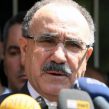
Turkish Political Actors Reassess Their Stance on the Kurdish Initiative
Publication: Eurasia Daily Monitor Volume: 6 Issue: 186
By:

Since the Turkish Prime Minister Recep Tayyip Erdogan’s announcement in August concerning the implementation of measures to resolve the Kurdish question, the debate over the government’s Kurdish initiative has intensified (EDM, August 14, 21, September 10, 21). One of the major criticisms of the Justice and Development Party (AKP) government was regarding its refusal to cooperate with the main opposition parties, both in sharing its plan to implement the reforms to end the Kurdish conflict and in clarifying the precise meaning of the initiative.
Due to public pressure on the government it tasked the Interior Minister Besir Atalay (the coordinator of the Kurdish initiative) with visiting the opposition parties in order to discuss the plan. However, the opposition Republican People’s Party (CHP) leader Deniz Baykal refused to meet with Atalay, because he had expected to hold direct talks with Erdogan instead. After months of public debate on whether Erdogan should meet Baykal to discuss the Kurdish initiative, he has finally sent a formal letter requesting a face-to-face meeting (NTV, October 8).
The “letter politics” in Ankara was a critical step to reach out to the opposition, since the Kurdish initiative might entail constitutional amendments and the number of AKP seats in parliament is insufficient to secure these changes; consequently the CHP’s support is crucial. Yet, the CHP asked Erdogan to present a complete package on exactly what he means by the Kurdish initiative. Baykal stated that the letter does not contain anything new. In his previous statements, he revealed his position: “We do not need to meet if the letter does not contain anything new” (Hurriyet, October 9).
Perhaps with the expectation that the CHP would not cooperate with the AKP, the Deputy Prime Minister Bulent Arinc played the referendum card. During a television interview Arinc suggested that if the CHP does not cooperate on amending some articles in the constitution, then the government might hold a referendum to secure widespread backing for its plans (Taraf, October 8).
Atalay confirmed that the majority of the work on the Kurdish initiative has now been finalized. “We have three international trips to the region, Syria, Egypt, and Iraq, in the first half of October. We think that the Kurdish initiative is closely related to Northern Iraq. The prime minister plans to bring this [the Kurdish initiative] to the attention of parliament in the second half of October” (Radikal, October 9).
Meanwhile, a survey carried out by the Wise Men Center for Strategic Studies (BILGESAM), a think tank comprised of retired military officers, ambassadors and academics, revealed that an overwhelming majority of Kurds are against the idea of any division of Turkey that could lead to the establishment of a separate country for themselves. Asked about possible solutions to the issue, Kurdish respondents pointed to higher standards of education in their region, economic investment, more employment opportunities, broader cultural rights, strengthening local administrations, a decrease in the birth rate among Kurds and Turkey’s future membership in the European Union (Today’s Zaman, October 9). In an earlier opinion poll, 51 percent of Turkish people supported the Kurdish initiative, while 63.8 percent disapproved of the stance taken by the CHP (Star, August 28).
Despite this level of support, Kurdish political actors, such as the Democratic Society Party (DTP) and the Kurdistan Workers’ Party (PKK) appear more pessimistic about the process. Initially, the DTP leaders declared that they would support any step toward democratization. However, recently the DTP has adopted a position more closely aligned with the CHP. Its leadership insists that the PKK’s imprisoned leader Abdullah Ocalan should be involved in the process as a negotiator, and that Ankara should recognize his status as a Kurdish leader (Show TV, October 9). The acting head of the PKK, Murat Karayilan defines the Kurdish initiative as “a scenario that intends to deceive the Kurdish people.” Thus, Karayilan calls for the Kurdish people to organize mass rallies to highlight Ocalan’s demands and stop Turkish military operations against PKK militants in the mountains (ANF News Agency, October 7).
It appears that the various political actors involved are reconsidering their position on the basis of such demands. The AKP government has no choice but to pursue the Kurdish initiative. More importantly, a slim majority of people support the Kurdish initiative, while opposition parties are confused over their stance. The recent opinion poll indicates that a majority of Kurdish people would welcome more democratic rights, rather than offer their support to Ocalan. Despite the DTP and PKK’s highly vocal campaign to promote the Ocalan factor in the Kurdish initiative, only 21 percent of Kurds said that the PKK and Ocalan had an important role to play in the process. Less than 20 percent said that Ocalan should be freed. More than 55 percent considered that Ocalan was used by “foreign powers” (Today’s Zaman, October 9). This figure creates anxiety among Kurdish political leaders, who fear losing their influence on the Kurds following the successful implementation of the Kurdish initiative. Indeed, for the CHP, this anxiety persists. However, in recent weeks it has modified the tone of its criticism toward the initiative.




